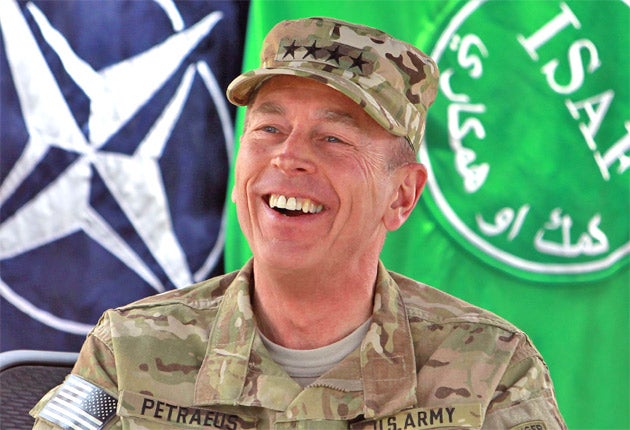Petraeus to head CIA as Obama imposes new order on US security

Your support helps us to tell the story
From reproductive rights to climate change to Big Tech, The Independent is on the ground when the story is developing. Whether it's investigating the financials of Elon Musk's pro-Trump PAC or producing our latest documentary, 'The A Word', which shines a light on the American women fighting for reproductive rights, we know how important it is to parse out the facts from the messaging.
At such a critical moment in US history, we need reporters on the ground. Your donation allows us to keep sending journalists to speak to both sides of the story.
The Independent is trusted by Americans across the entire political spectrum. And unlike many other quality news outlets, we choose not to lock Americans out of our reporting and analysis with paywalls. We believe quality journalism should be available to everyone, paid for by those who can afford it.
Your support makes all the difference.General David Petraeus, the US commander in Afghanistan, is set to become CIA director as part of a major shake-up of President Obama's national security team, in which the agency's current director, Leon Panetta, will replace Robert Gates as Defence Secretary.
The long-rumoured changes, that could be announced by the White House today, are likely to take effect this summer, when the much-admired Mr Gates – the lone Republican holdover from the Bush administration – is expected to step down after five years in one of US government's most gruelling jobs.
As part of the overhaul, details of which were confirmed by White House officials yesterday, General John Allen, currently deputy head of US Central Command, will replace General Petraeus in Afghanistan. He will work with Ryan Crocker, one of America's most experienced diplomats, who is to become the new US envoy to Kabul.
Though sweeping at first glance, the reshuffle signals a continuation of present policies – underlining the administration's determination to bring the decade-long war in Afghanistan to a successful conclusion, and to press on with the reforms at the Pentagon initiated by Mr Gates.
From the moment Barack Obama persuaded him to stay on in November 2008, the outgoing Defence Secretary has indicated he would not serve out the new President's entire first term. The change-over this summer will allow the required Senate confirmation hearings to be held before the 2012 election campaign gets into full swing, making the atmosphere on Capitol Hill even more contentious.
Nonetheless, Mr Gates's departure will be a sore loss for Mr Obama. Calm-mannered, vastly experienced, and frequently described as a "grown-up" who stood above the ego-driven fray of Washington politics, he offered a complete change of style from his bullying, controversial predecessor Donald Rumsfeld, removed by Mr Bush 24 hours after the Republican drubbing at the November 2006 midterm elections. By then, feuding between the State Department and the Pentagon had become almost the norm in Washington, to the detriment of policy-making. By contrast, relations between Mr Gates and Hillary Clinton, the Secretary of State, have been exemplary, while Mr Gates has moved to cut military spending by trimming the huge bureaucracy that oversees the department's $700bn annual budget.
Under Mr Panetta, however, it is likely to be more of the same. The former congressman became White House budget director and then President Bill Clinton's chief of staff before earning plaudits at the CIA. He is as skilled a bureaucratic operator as Mr Gates and well-suited to head the defence department when deficit cutting is the priority.
General Petraeus's switch to the CIA also sends a clear message. As the Army's top specialist in counter-insurgency operations, he will bring that expertise to the CIA – which already plays a central role in fighting terrorism.
His prestige will also come as a re-assurance to the Agency itself, buffeted by endemic feuding within the US intelligence establishment and whose reputation has yet to fully recover from the twin disasters of failing to anticipate the 9/11 attacks, and of being duped into believing Saddam Hussein had weapons of mass destruction.
Some analysts saw political implications in the move. General Petraeus, the architect and executor of the troop "surge" that averted disaster in Iraq, has been credited intermittently with political ambitions, however adamantly he denies them. Under this theory, therefore, President Obama has moved to neutralise a potentially dangerous rival for 2012, especially when the existing Republican field seems so thin.
The background of General Allen, who now takes over command of the Afghan campaign, is in the Marines. But he too is a strategist with a finely tuned political ear. In Kabul, he will be able to draw on the experience of Mr Crocker, who worked with General Petraeus in Iraq as part of a "dream team" to haul the country back from the brink.
Subscribe to Independent Premium to bookmark this article
Want to bookmark your favourite articles and stories to read or reference later? Start your Independent Premium subscription today.
Join our commenting forum
Join thought-provoking conversations, follow other Independent readers and see their replies
Comments